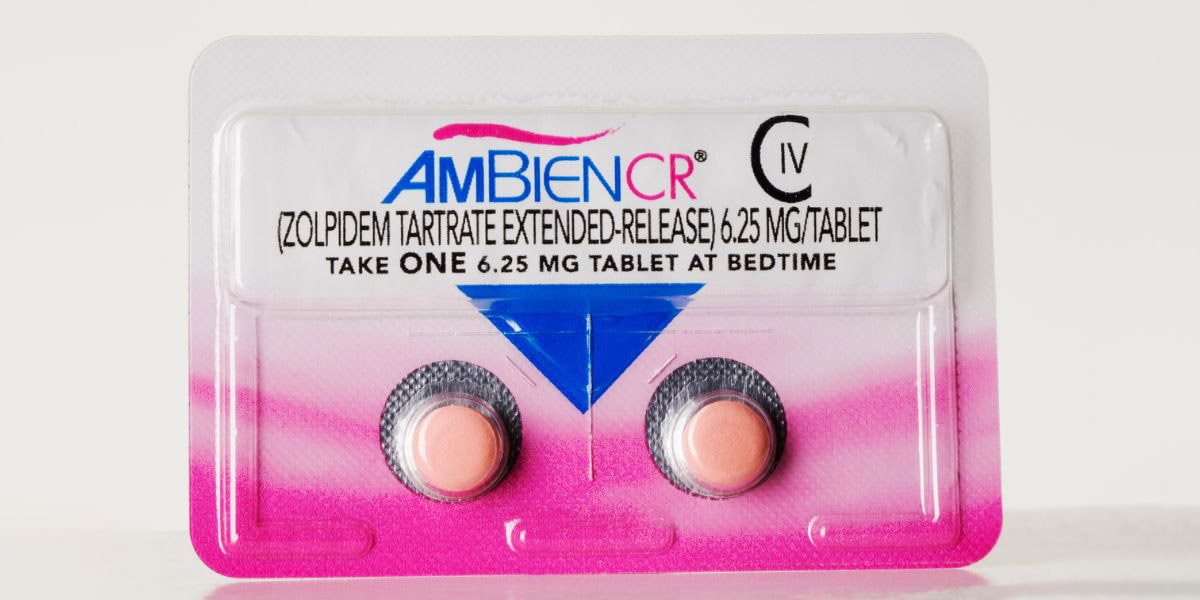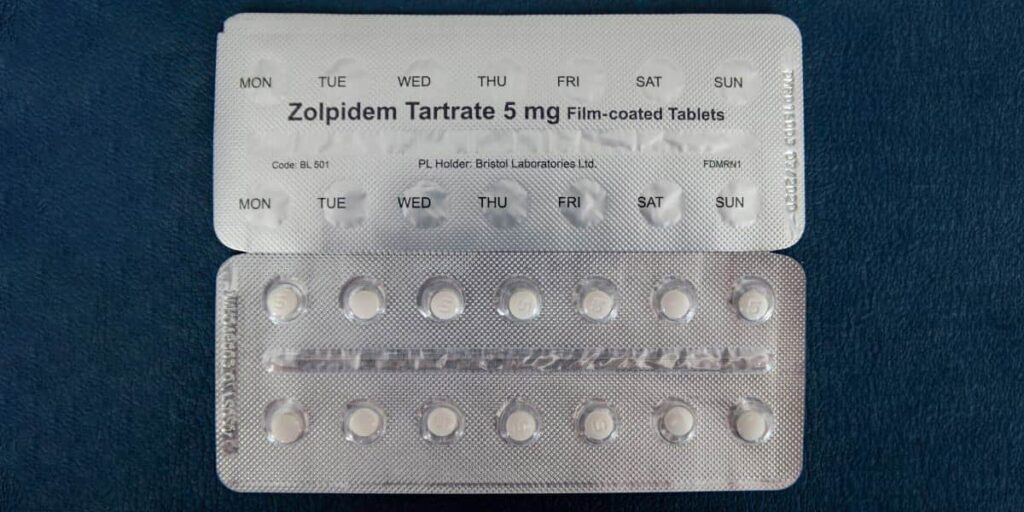Ambien Abuse and Addiction


Over 15 million people in the United States depend on prescribed sleep drugs like Ambien to handle their sleeplessness.
At first, doctors thought sleeping pills were not addictive and had a low risk of causing physical dependence. They were seen to fix bad sleep habits, and more people began using sleep aids. This led to an increase in reports of side effects, health problems, addiction, and overdoses. These issues were often associated with Ambien and other substances.
The National Survey on Drug Use and Health, known by NSDUH, revealed in a 2020 study that an estimated 343,000 people began misusing prescription sleep drugs for the first time.
What Is Ambien?
Zolpidem, a drug to treat insomnia and sleep issues, is also called Ambien. It’s a type of medicine known as sedative-hypnotics. These medications are frequently termed as “Z-drugs.”
Zolpidem is a Schedule IV controlled substance, meaning it has a low risk of misuse and addiction, both physically and psychologically.
Zolpidem comes in different versions like a regular tablet, an extended-release tablet (Ambien CR), a tablet that dissolves in the mouth (Intermezzo, Edluar), and an oral spray solution (Zolpimist).
Ambien is intended for short-term use rather than long-term treatment. It helps individuals fall asleep more easily and remain asleep for longer periods.
Like benzodiazepines, Ambien works by calming the central nervous system. It affects nerve receptors in the brain, promoting relaxation and sleepiness.

Ambien Addiction
It is possible to become dependent on Ambien in just two weeks. This can happen even though it may take longer than other strong drugs.
The National Institute on Drug Abuse (NIDA) approximates that roughly 1.2 million Americans struggle with sedative misuse.
The pharmaceutical company Sanofi Aventis promoted Ambien as safe and non-addictive as Purdue Pharma did with OxyContin.
Addiction to Ambien is similar to benzodiazepine addiction. Some people combine this medication with alcohol and drugs to increase its potency. This can result in addiction and dangerous side effects.
Mixing this medication with other substances can be harmful. It is important to use this medication as directed by a healthcare professional.
The Drug Abuse Warning Network (DAWN) reports that from 2005 to 2010, emergency room visits related to Ambien rose by 220% over those five years. Half of these visits involved interactions with other medications.
In 2013, the Food and Drug Administration (FDA) changed Ambien’s dosage and warning label to show the risks of dependency better.
Ambien Abuse Signs and Symptoms
Identifying Ambien abuse can be difficult, partly because its symptoms can mirror those of insomnia, causing individuals to appear exhausted, irritable, and distracted.
Initially, people may seem to be doing well if they start sleeping better. However, signs and symptoms become more evident over time.
Physical symptoms of Ambien abuse may include:
- Daytime drowsiness
- Reduced coordination
- Dizziness
- Nausea
- Memory loss
- Slowed heart rate
- Labored or slow breathing
- Sore throat
- Sinus congestion
- Joint pain
- Bloodshot eyes
- Delayed reaction times
- Hallucinations
- Withdrawal symptoms
Certain behaviors can indicate Ambien addiction. Some physical symptoms may be due to factors such as lack of sleep.
Behaviors that suggest Ambien addiction include:
- Consuming higher doses to intensify the effects
- Combining the medication with other substances
- Seeking prescriptions from multiple doctors
- Purchasing it illegally
- Acquiring it from friends or family
- Inability to stop using due to cravings or withdrawal symptoms
- Regularly oversleeping beyond intended times
- Failing to meet obligations due to exhaustion
Since most people take this medication at night, you may not see them actually taking the pills. It’s important to be aware of other signs of abuse and addiction.
Ambien Side Effects
Ambien aims to help users fall asleep more quickly and achieve a higher quality of sleep.
Ambien is addictive and has many side effects, some of which can be harmful. Certain individuals who misuse zolpidem claim that if they can fight off the initial sleepiness, they feel a surge of happiness and relaxation.
Potential side effects of using Ambien include:
- Persistent vertigo
- Loss of memory
- Prolonged tiredness
- Visual illusions
- Severe emotional fluctuations
- Intensifying or emerging depression
- Nervousness
- Unwanted thoughts
- Thoughts of suicide
Ambien can cause people to do things while asleep and not remember them when they wake up.
Ambien users often exhibit complex behavior, leading doctors to assign a specific name and category for it due to its prevalence— complex behavior.
The FDA says complex behavior is when someone does things while not fully awake and doesn’t remember them after taking medication.
Over the years, numerous injuries and deaths have been attributed to complex behaviors exhibited by people while using Ambien.
There are limited effective prevention measures for complex behaviors, particularly for individuals who live alone. Many people do not remember doing these actions. Some only have a fuzzy memory. This can make stopping something you did not intend to do difficult.

Ambien Withdrawal
To safely stop taking Ambien, talk to your doctor about slowly reducing your dose. Although you may still encounter withdrawal symptoms, they will be less severe than if you stopped abruptly.
Withdrawal symptoms usually begin within 48 hours after the last dose and can vary from disruptive to life-threatening.
Ambien withdrawal symptoms include:
- Insomnia relapse
- Uneasiness
- Emotional fluctuations
- Perspiration
- Sickness
- Regurgitation
- Trembling
- Tiredness
- Accelerated heartbeat
- Agitation
- Cramps in the stomach and abdomen
- Episodes of panic
- Bewilderment
- Delusions
- High blood pressure
- Changes in body heat
- Convulsions
Should a medical crisis occur, dial 911 or arrange for someone to take you to the closest emergency department.
In certain instances of severe addiction, it may be essential to undergo medically assisted detox at a reputable facility.
Ambien Addiction Treatment
If you or someone you care about is struggling with Ambien addiction, compassionate care, and effective treatment options are available.
At White Oak Recovery Center, we address addiction by considering all aspects of substance abuse and mental health issues. We take a holistic approach to treatment.
Our team at White Oak Recovery Center devotes themselves to helping you with addiction recovery that lasts. We provide a supportive and nonjudgmental environment and aim to ensure your success.
Our facility provides on-site medical detox to help you safely manage withdrawal symptoms, reset your body, and develop healthy habits.
We use evidence-based therapies and support groups to help you understand how substance abuse has affected your life. We aim to fix the harm caused by substance abuse. Our goal is to help you maintain a strong and long-lasting recovery.
Reach out today. Our treatment specialists are eager to answer any questions you may have.

Am I covered for addiction treatment?
Your insurance may cover treatment. Call now for an entirely free and confidential assessment. Recovery starts with a phone call.

- Edinoff, Amber N., et al., “Zolpidem: Efficacy and Side Effects Insomnia.” Health Psychology Research, Jun. 2021.
- Heydari, Mostafa, and Isfeedvajani, Mohsen S., “Zolpidem Dependence, Abuse, and Withdrawal: A Case Report.” Journal of Research in Medical Sciences, Nov. 2013.
- “Zolpidem.” National Institute of Diabetes and Digestive and Kidney Diseases, Feb. 2018.
- Harrison, Tracy Swainston, and Keating, Gillian M., “Zolpidem.” Adis Drug Evaluation, Aug. 2012.
- “Emergency Department Visits for Adverse Reactions Involving the Insomnia Medication Zolpidem.” Substance Abuse and Mental Health Services Administration, May 2013.
- “Zolpidem.” MedlinePlus: National Library of Medicine, 2023.
Medical Disclaimer:







